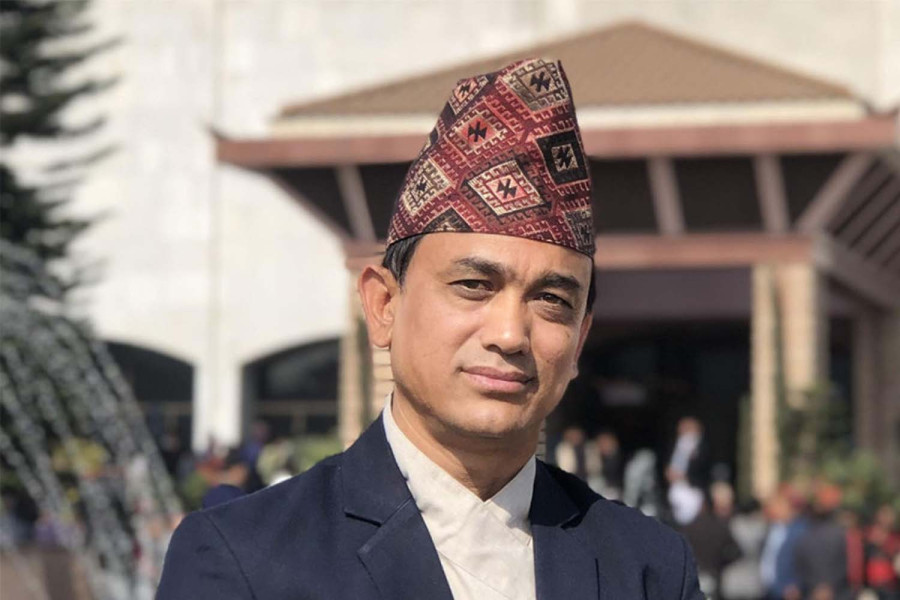National
Suspended Swatantra Party lawmaker now on corruption watchdog’s radar
The tradition of exchanging positions of power for money will promote policy corruption, experts say.
Prithvi Man Shrestha
A complaint has been registered at the Commission for Investigation of Abuse of Authority (CIAA) to investigate an alleged attempt by the Rastriya Swatantra Party Lawmaker Dhaka Kumar Shrestha to ‘buy’ for himself the post of health minister.
In a leaked audio, a voice, allegedly of Shrestha, demands Rs20 million from another person, presumably the controversial medical entrepreneur Durga Prasai, so that Shrestha can become health minister and “bring about radical reforms in the health sector.”
Prasai is the owner of the Birtamode-based B&C Medical College and Teaching Hospital. It appears that Shrestha and Prasai had engaged in a phone conversation to discuss the same on January 15 and the recording was leaked on Sunday.
Another tape has also been leaked on Monday in which a voice allegedly of Shrestha’s brother says he wants to talk to Prasai.
Bhola Dahal, spokesperson at the CIAA, said that a complaint has been registered at the anti-graft body based on the leaked audio and media reports. “The commission has the authority to investigate corruption cases based on complaints registered through telephone and media reports,” he said. “There will be further investigation in line with established CIAA procedures.”
The RSP, led by journalist-turned-politician Rabi Lamichhane, has suspended Shrestha from lawmaker and party member positions after the first audio tape was published on social media.
The party’s central discipline committee led by Bharat Mani Devkota has been entrusted with an ‘in-depth investigation’.
In a notice on Sunday, RSP General Secretary Mukul Dhakal instructed the party’s Central Discipline and Conduct Committee to launch an investigation into the matter and submit a report to the central committee within three days.
“We have received the report of the discipline committee. The report will be presented at the central committee, and the party meeting scheduled for Wednesday will discuss it,” Dhakal told the Post. “The central committee meeting has been called for 9am tomorrow.”
RSP chief whip Santosh Pariyar said the discipline committee has already sought clarification from Shrestha in person after inviting him to the party headquarters at Basundhara on Tuesday and a final call on Shrestha’s case would be made at the earliest.
According to party leaders, Shrestha has reiterated that the audio tape was tampered with and insisted that the voice was not his, but has also agreed to accept any decision the party takes.
Dhaka Kumar Shrestha was elected to the lower house last year from the indigenous nationalities category under the proportional representation system. The RSP became the fourth largest force in the House of Representatives through last November’s major polls, winning 20 seats months after its establishment.
The audio tape leak emerged as a huge setback to the newly formed party which claims to be at the forefront of alternative politics in Nepal.
The RSP champions good governance and zero tolerance on corruption. On Friday, it had even backed away from supporting the new Common Minimum Programme when its pet anti-corruption agenda was not included in it. However, now the party is itself being rocked by a corruption scandal.
Experts say that the scandal has once again exposed how positions of power are exchanged for financial gains in Nepal.
“It is the first time I have heard evidence of a bribe being sought to become a minister,” said Khem Raj Regmi, former president of Transparency International Nepal, an anti-corruption watchdog. “We have already seen the gross misuse of the proportional system of representation in parliament. Instead of members from the marginalised communities, it is the businesspersons who are being elected based on the monetary support they provide to parties and the leaders concerned.”
He said that such tendency would create ground for policy corruption as such leaders seek to recover money spent on getting the post.
Gauri Bahadur Karki, former chairperson of the Special Court, said exchange of position of power with money is a long-held tradition even though a case of it has been exposed only now.
“Those who reach positions of power with financial backing of certain interest groups not only seek to recoup the money spent but also look to build a war-chest for the next election,” Karki said.




 10.12°C Kathmandu
10.12°C Kathmandu














